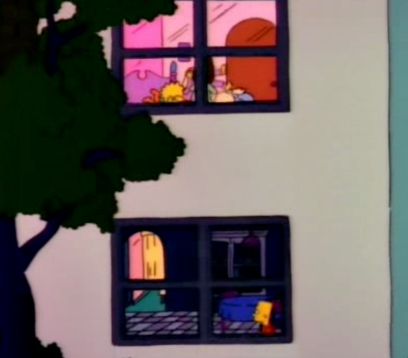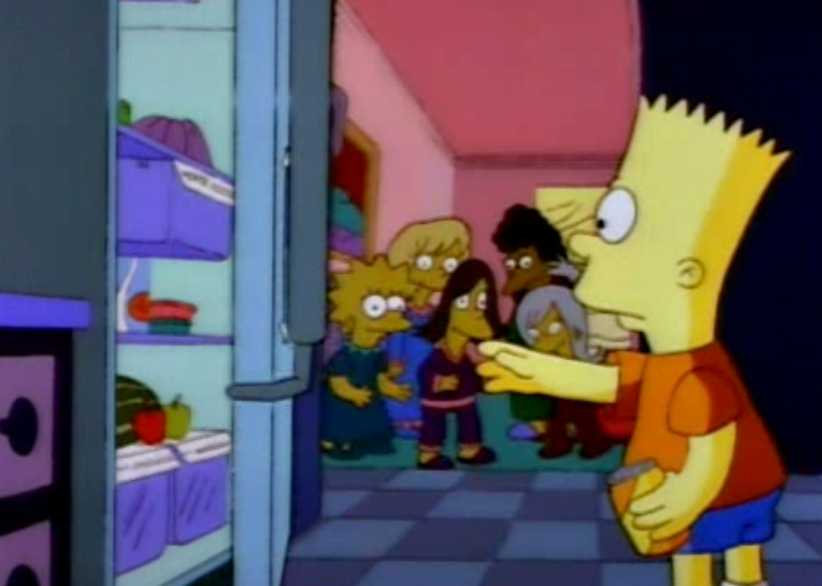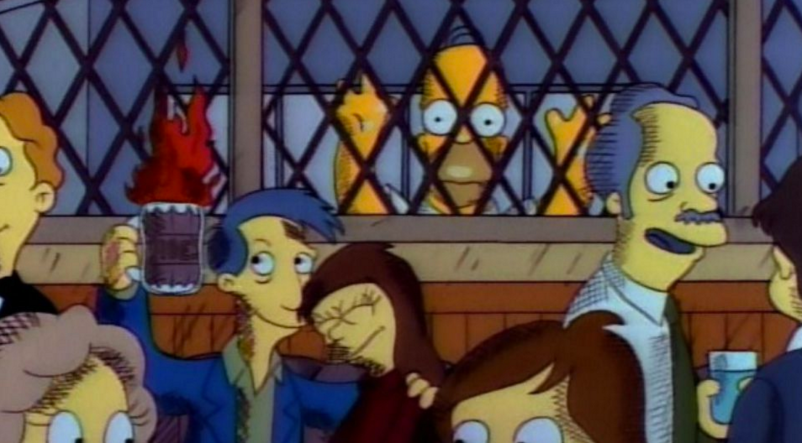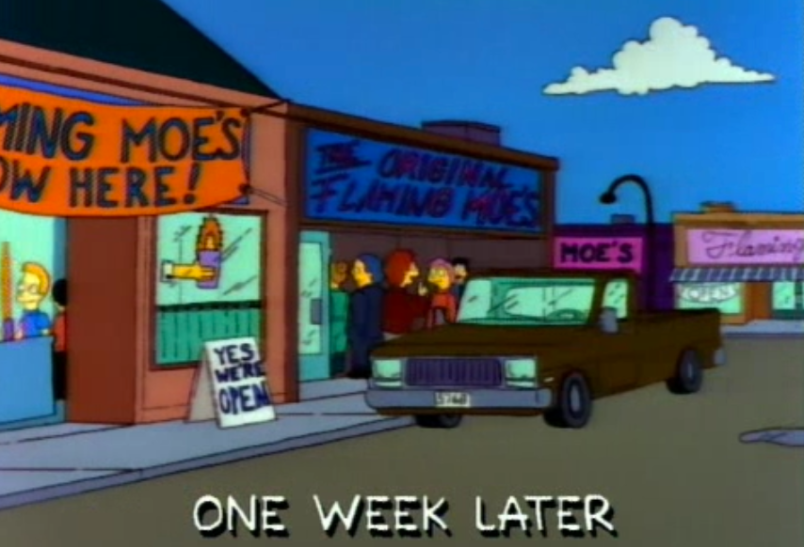3.10 Flaming Moe’s
Homer seeks revenge after Moe steals his secret drink recipe.
“There’s a party in my mouth and everyone’s invited” is a thing people say without even intending to reference The Simpsons—this episode is that popular.
I’ve always loved the “Eye on Springfield” bit, followed by Homer’s comment, “Wow, infotainment.” The low-status fool functions to provide piercing insight laterally and/or unintentionally. I always say Homer is at his funniest when he is aware of what’s going on sort of.
Also what is infotainment if not intellectual cough syrup (more on that in a moment).
Side note: Look at the storyboarding here as Lisa’s friends chase Bart down to kiss him, then give him a makeover:

I’m less equipped to critique direction than, say, voice acting and storytelling, but damned if this scene isn’t just…logistically well done.

The light from the fridge, the girls in the darkness, the position of the camera…just bravo, animators.
So, cough syrup. That the secret ingredient to Homer’s drink is the Krusty brand variety has me thinking about branding, and how the Flaming Moe (the drink) represents Homer—the character as well as the archetype he embodies.
The Flaming Moe is a combination of what’s left of bottles in the liquor cabinet. Homer is a bunch of leftovers from fool characters that have come before him. He’s a teaspoon of John Falstaff, a dash of Archie Bunker, and a pint of Fred Flinstone.
Homer is a pastiche of things that everyone gets. I could say “D’oh!” in most parts of the world and people who know a dozen words in English would exclaim, “Homer Simpson!” Like that German soldier in Saving Private Ryan who, cornered by the good ol’ American boys, rattles off a bunch of names like Betty Boop in a desperate attempt to get the Yanks on his side.
It’s a party in your mouth, and everyone’s invited.
Krusty cough syrup is an homage to Flintstones vitamins. So, the Krusty brand within the Simpsons brand is referencing a Flintstones-branded brand, and we in 1991 or 2017 are more or less all in on the joke. If you don’t get Flintstones, you at least get Krusty. Layers of branding like sediment compress together and form a map we use to understand one another in the era of the brand.
To go a little further on this tangent, as a species we’re adapting to living in pods of five rather than fifty. In our pods we’re exposed individually to branded concepts—let’s say the concept is a Starbucks latte. You might think the Starbucks latte is a goofy concept. Or you think it’s something that; if you don’t get one, you will function badly for the whole day.
Pumpkin Spice? It’s either something you spent September looking forward to or something you laugh at the omnipresence of. If you’re in the latter group, you’re not a whole lot less useful to Starbucks than the former group, because at least you’re having a reaction at all.
Wherever you are on the “lattes are goofy” spectrum, you can emerge from your pod and relate to people who react to the concept of a Starbucks latte in similar ways. You can go from your house to a larger, less intimate group—let’s say a workplace, and use that shared concept to more or less engage with people you could more or less live without.
You drop your name tag.
“Haven’t had my Starbucks yet.”
The customer laughs, and no one dies. That brands have infiltrated the language of these relationships is, for better or worse, where we’re at. All Wikipedia entries for specific Simpsons episodes (as is the case with many TV shows) have an entire category called References. We’re a culture that struggles to function without them.
If the Bible were written today, perhaps References would be a chapter. Maybe it’d feature a rebuilding of the Tower of Babel, except now the tower has a brand name slapped across it in massive type. Maybe that brand gets so recognizable that it too can one day grow up to be Pres—Ok I’ll shut up.
Homer describes the final addition to the drink: “I don’t know the scientific explanation, but fire made it good.”
Why is “Flaming Moe’s” an episode we all get? Were the Cheers references such a gateway that everyone talked about those, which in turn led to everyone talking about The Simpsons more? It’s common nowadays to know the words to the parody better than the original, as was the case for me and the “Flaming Moe’s” song that parodies the Cheers theme.
The song, by the way, opens the third act, serving as a perfect emotional reset in building to the climax of the episode. This episode is so dense with stuff to analyze, has a laugh every few moments, and is just incredibly well-structured.

My single most favourite thing about The Godfather is how Francis Ford Coppola uses windows, doors, and long shots to represent not just power, but inclusion. Comedy brings with it a competitive social element. Are you in on the joke? Do you get the reference? Are you invited to the party?
The man who offers to buy the Flaming Moe works for Tipsy McStagger’s Good Time Drinking & Eating Emporium. He confesses that there’s no real Tipsy McStagger; that he’s just a composite of other successful logos. I choose to believe the writers were remembering the bottles-in-the-liquor-cabinet makeup of the Flaming Moe when introducing Tipsy McStagger.
This episode couldn’t have worked as well if it was Moe inventing the drink only to lose exclusive rights to it. Having it go from Homer, to Moe, to the whole city owning it makes a larger point about the chain of human ideas and how capitalism funnels them to consolidate money and power; likes and views.
Even this blog entry has been me communicating my own ideas about life and politics through The Simpsons. If I just pontificated for 1000 words on branding and intellectual property, would it be as relatable? Sure, I’m the author of this piece, but it’s also a combination of thoughts I’ve heard from others and am now filtering through my own reference points. Then it’s sweetened with Simpsons quotes so it can go down easier. Which is a convoluted way of saying an also-convoluted thing—this is my brand.
“Flaming Moe’s” is not without its problems. Colette, the waitress character, exists only to convince Moe to sell the drink and split the earnings with Homer. Her character serves the exact same function as Ms. Pennycandy in the otherwise excellent “Like Father, Like Clown”: To humanize the more-important male character who is Being Kind Of A Dick.
I’m not saying take all The Simpsons’ Emmys away; I am saying this is a fucking bullshit trope and the writers deserve criticism for relying on it.
Moe’s line, “I sleep with a chick once and it costs me half a million bananas” doesn’t make fun of sexism, it simply reproduces it for a cheap laugh. It’s not funny now, and I struggle to understand how it was funny then, other than as a point of recognition for misplaced male anger. (Which, if that’s your idea of funny…)
And can we just acknowledge that chasing a boy down and kissing them forcefully is like…y’know, assault?
Anyway.
From the “Eye on Springfield” bits to the Aerosmith cameo plus Phantom of the Opera reference; to the Flaming Moe derivatives that crop up across Springfield when Homer reveals the secret ingredient, this episode is about the ramifications of mass media and intellectual property, expressed through the everyday conflict of jealousy between peers.

The Simpsons’ writers love to explore genesis states followed by a boom, be it the frogs in Bart vs. Australia or early explorations of the Simpson family’s fame in Treehouse of Horror.
That Homer reveals the secret ingredient publicly is perhaps the best possible outcome, as now everyone has access to the drink, even if he and Moe were unable to make a living off of it. We’re left with Marge’s line, “Take some consolation in the fact the something you created is making so many people happy.” Maybe so, it’s not like this episode is naive about the fact that we’ve built a society where accessibility has costs.
Best Moment: The Cheers-inspired Act 3 opener.
Best Quote: “Take those to the teacher’s lounge! You can have what’s left at the end of the day.” —Edna Krabbapel (when Bart reveals the liquor bottles in his backpack)